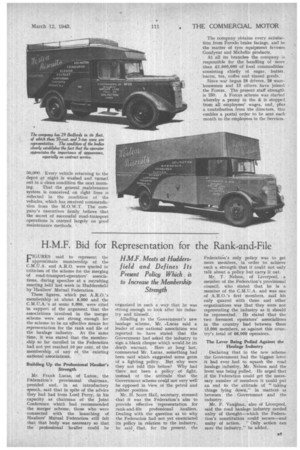H.M.F. Bid for Representation for the Rank-and-File •
Page 29

If you've noticed an error in this article please click here to report it so we can fix it.
H.M.F. Meets at Huddersfield and Defines Its Present Policy Which, is to Increase the Membership Strength
FIGURES said to represent the approximate membership of the C.M.U.A. and A.R.O. were quoted in criticism of the scheme for the merging of road-transport-operators' associations, during speeches at a recruiting meeting held last week in Huddersfield by Hauliers' Mutual Federation.
These figures, which put A.R.O.'s membership at about 8,000 and the C.M.U.A.'s at some 5,000, were cited in support of the argument that the associations involved in the merger, scheme were not strong enough for the scheme to be an effective means for representation for the rank and file of the haulage industry. At the same time, it was stated that the membership so far enrolled in the Federation had not yet reached 10 per cent, of the membership of any of the existing national associations.
Building Up the Professional Haulier's Strength Mr. Frank Lucas, of Luton, the Federation's provisional chairman, presided and, in an introductory speech, said that in spite of the advice they had had from Lord Perry, in his capacity as chairman of the Joint Conference which had recommended the merger scheme, those who were connected with the launching of Hauliers' Mutual Federation still felt that that body was necessary so that the professional haulier could be organized in such a way that he was strong enough to look after his industry and himself.
Alluding to the Government's new haulage scheme, Mr. .Lneas said a leader of one national association was reported to have stated that the Government had asked the industry to sign a blank cheque which would be its death warrant. Here at long last, commented Mr. Lucas, something had been said which suggested some germ of a fighting policy. But why were they not told this before? Why had there not been a policy of fight, instead of the attitude that the Government scheme could not very well be opposed in View of the petrol and rubber. position.
Mr. H. Scott Hall, secretary, stressed that it was the Federation's 'aim to provide effective representation for rank-and-file professional hauliers. Dealing with the question as to why the Federation had not yet enunciated its policy in relation to the industry, he said that, for the present, the FederatiOn's only policy was to get more members, in order to achieve such a strength that it could not only talk about a policy but carry it out.
Mr. T. Nelson, of Liverpool, a member of the Federation's provisional council, who stated that he is a member of the C.M.U.A. and was one of A.R.O.'s first members, said his only quarrel with those and other organizations was that they were not representing the industry as it should be represented. He stated that the two foremost operators' associations in the country had between them 13,000 members, as against this country's total of 66,000 operators.
The Lever Being Pulled Against the Haulage Industry
Declaring that in the new scheme the Government had the biggest leer it had ever had to squash the, road haulage industry, Mr. Nelson said the lever was being pulled. He urged that if the Federation could get the necessary number of members it could put
an end to the attitude of taking things lying down," in matters as between the Government and the industry.
Mr. F. Vaukha.n. also of Liverpool, said the road haulage industry needed unity of thought—which the Federation's constitution could secure—and unity of action. " Only action can save the industry," he added.




























































